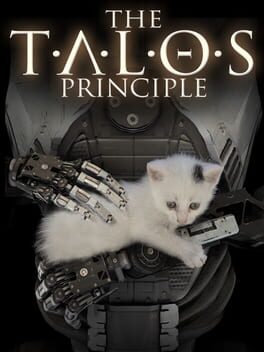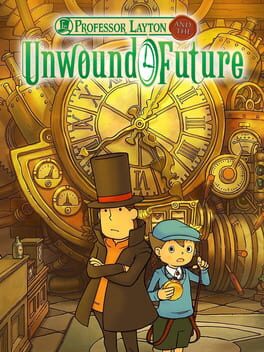RinFaen
Bio
Nothing here!
Badges

GOTY '23
Participated in the 2023 Game of the Year Event

Gamer
Played 250+ games

N00b
Played 100+ games
Favorite Games
435
Total Games Played
017
Played in 2024
072
Games Backloggd
Recently Played See More
Recently Reviewed See More
A great, tight, puzzle game that doesn't overstay it's welcome.
Botany Manor provides a novel, and unique, set of puzzles which are all about botany during the 18th century England. Taking me a little under 4 to complete the game doesn't give itself any time to get long in the tooth and that is to it's credit resulting in all of the puzzles feeling engaging and enjoyable as opposed to tedious.
It provides little in terms of story, but just enough to have a payoff after the credits roll. Which is another aspect of the game that works in its favour, as is the case with quite a few indie puzzle games where too much of a focus is put on a poor story that drags the rest of the game with it.
Accompanying the puzzles is an equally enjoyable setting, in which the game takes place - the titular Botany Manor, in the Somerset Countryside providing the player with an enjoyable set of views for the duration of the game. Which is further backed up by the games stylistic approach. Working hand in hand with the games art style the music to the game provides a relaxing atmosphere that doesn't grate on the ears, further enhancing the experience.
My only major gripe with the game would be that the sprint mechanic seemed to kick in as and when it wanted despite me having it toggled on the entire time. Sometimes I would move at a quick pace, but other times I would be going no quicker than the games walk speed. Sadly this elongated some of the late game puzzles which involved quite an amount of back and forth throughout the manor lands for me.
Botany Manor provides a novel, and unique, set of puzzles which are all about botany during the 18th century England. Taking me a little under 4 to complete the game doesn't give itself any time to get long in the tooth and that is to it's credit resulting in all of the puzzles feeling engaging and enjoyable as opposed to tedious.
It provides little in terms of story, but just enough to have a payoff after the credits roll. Which is another aspect of the game that works in its favour, as is the case with quite a few indie puzzle games where too much of a focus is put on a poor story that drags the rest of the game with it.
Accompanying the puzzles is an equally enjoyable setting, in which the game takes place - the titular Botany Manor, in the Somerset Countryside providing the player with an enjoyable set of views for the duration of the game. Which is further backed up by the games stylistic approach. Working hand in hand with the games art style the music to the game provides a relaxing atmosphere that doesn't grate on the ears, further enhancing the experience.
My only major gripe with the game would be that the sprint mechanic seemed to kick in as and when it wanted despite me having it toggled on the entire time. Sometimes I would move at a quick pace, but other times I would be going no quicker than the games walk speed. Sadly this elongated some of the late game puzzles which involved quite an amount of back and forth throughout the manor lands for me.
A game born from the desire of developers to tell people that their life is worth living and that death is not something that should be looked at with fear.
A game that deeply craves to be something that changes the players view points on life, And death. One which succeeds at its desires in a way which many games can only dream of.
A deeply meaningful game that deals with its themes in a considerate, and meaningful, way. While also being mindful enough to give the player time and space to think about what they are being confronted with. Though at some point giving its players a bit too much time to think. Leading to a period of time towards the end where nothing noteworthy happens from both a story and gameplay point of view.
Bringing a diverse, reasonably so, set of characters to the table - one which all players can relate to. All of which are born of different backgrounds; be it the lavish life of luxury of Mitsuru Kirijo, or the comparatively downtrodden, miserable life of Shinjiro Aragaki. All of whom are brought together by the mundanity of high school life, in most cases, further adding to their relatability for most players. Leading to the cast of characters being a group that the players are able to form deep bonds with reasonably quickly, heightening the meaning of the events that transpire.
Throughout your time spent with Persona 3 and it's characters there is another aspect that conjoins them; albeit thematically and not socially. And that is death. Though it is more than just death, it is how they deal with it. As well as the many different forms that death can appear throughout ones life. Be it the death of a parent, the death of a son, the death of the self or even the death of a dream. Although all of these characters have different says that they deal with death as well as its consequences on their lives. One thread which runs throughout all of the different stories told around death in Persona 3: Do not let death drown you in its deep dark depths of ruination. You will always come out on the other side as a person who has changed and one who lets their experience with death drive them forwards as a means of motivation and passion.
The characters in Persona 3 are, for the most part at least, compelling and enjoyable to spend time with and to learn more about. Even those that aren't still provide good character moments in their respective arcs. The main cast of characters will be a group that I will be thinking about for months to come. A cast of people that I was finding myself rooting for in ways that I have seldom had in games.
Ultimately Person 3 was a game which carried innumerable weight upon its shoulders with the things that I had heard about it prior to playing it. I came into the game expecting a great tale, great people and a memorable time. And it brings me great joy to say that I got all of those things And more with Persona 3. It is a game that is welcomed into my pantheon of greats; perhaps with other games even wondering why it took so long to show up.
Truly a wonderful experience that I will cherish for time to come.
A game that deeply craves to be something that changes the players view points on life, And death. One which succeeds at its desires in a way which many games can only dream of.
A deeply meaningful game that deals with its themes in a considerate, and meaningful, way. While also being mindful enough to give the player time and space to think about what they are being confronted with. Though at some point giving its players a bit too much time to think. Leading to a period of time towards the end where nothing noteworthy happens from both a story and gameplay point of view.
Bringing a diverse, reasonably so, set of characters to the table - one which all players can relate to. All of which are born of different backgrounds; be it the lavish life of luxury of Mitsuru Kirijo, or the comparatively downtrodden, miserable life of Shinjiro Aragaki. All of whom are brought together by the mundanity of high school life, in most cases, further adding to their relatability for most players. Leading to the cast of characters being a group that the players are able to form deep bonds with reasonably quickly, heightening the meaning of the events that transpire.
Throughout your time spent with Persona 3 and it's characters there is another aspect that conjoins them; albeit thematically and not socially. And that is death. Though it is more than just death, it is how they deal with it. As well as the many different forms that death can appear throughout ones life. Be it the death of a parent, the death of a son, the death of the self or even the death of a dream. Although all of these characters have different says that they deal with death as well as its consequences on their lives. One thread which runs throughout all of the different stories told around death in Persona 3: Do not let death drown you in its deep dark depths of ruination. You will always come out on the other side as a person who has changed and one who lets their experience with death drive them forwards as a means of motivation and passion.
The characters in Persona 3 are, for the most part at least, compelling and enjoyable to spend time with and to learn more about. Even those that aren't still provide good character moments in their respective arcs. The main cast of characters will be a group that I will be thinking about for months to come. A cast of people that I was finding myself rooting for in ways that I have seldom had in games.
Ultimately Person 3 was a game which carried innumerable weight upon its shoulders with the things that I had heard about it prior to playing it. I came into the game expecting a great tale, great people and a memorable time. And it brings me great joy to say that I got all of those things And more with Persona 3. It is a game that is welcomed into my pantheon of greats; perhaps with other games even wondering why it took so long to show up.
Truly a wonderful experience that I will cherish for time to come.
Coming into this game with the previous entry into the franchise being one of my favourite games ever, and my favourite game in it's genre, is something to keep in mind for the review.
It is clear from the outset that Talos Principle 2 sets out to be more ambitious than Talos Principle from a story point of view, with the game starting you post the events of Talos Principle yet still keeping you in the same environments with the same graphical style of the first game, as well as the same puzzle elements from that game. Once you have completed this area the game takes on it's own life. With you quickly being introduced to many of the citizens of the city in which the game takes place. Notably via conversations with dialogue trees, as well as cutscenes - which are a welcome change from solely being delivered information through the use of computer terminals.
The story of Talos Principle 2 is fine, it does it's job. But it is not a particularly strong story. There is a large group of characters that you meet throughout the game, all of which have their own personal view points on the events of the game shaped by their political interests and aims. Sadly many of which feel like they are nothing but walking stereotypes of the aspect of Talos Principle 2's political spectrum that they inhabit. Despite the amount of characters that are present in the game, no more than a handful of them are meaningful or interesting to interact with throughout the game. Many of the threads that I found more interesting lay, once again, in the terminals. This time via audio logs as well as text logs. Which lead me to feel a sense of apathy at the site of seeing one of my robot friends menacingly standing 100 meters in the distance patiently waiting for me to inch closer in order to trap me into a conversation when I would much rather be exploring the environment trying to find puzzles as well as various secrets hidden throughout.
There are 12 main areas in Talos Principle 2 which house the large majority of puzzles in this game. Split into 4 areas of 3 zones with each area opening up more upon both puzzle, and story, progression. With many of these 12 areas possessing 10 puzzles each of which introduces and builds on it's own unique mechanic, with the exception of the final area, which ranges from teleportation to clones to inverting the colours of lasers. You might be predisposed to think that 120 puzzles with eleven different mechanics is a game which possesses large amount of gameplay variety to keep the player engaged for the entire time they are playing. The large assortment of puzzles mechanics does keep things fresh from a gameplay perspective, from a puzzle perspective however it falls flat.
10 puzzles is not a large amount. Especially when considering that due to a new mechanic being introduced in almost every new zone that you visit, at least one of which must function as tutorialization for the new mechanic and how it may, or may not, interact with the environment in addition to any previous mechanics that may be available in your current zone. Combine this with the type of puzzles which are present in both Talos Principle and Talos Principle 2 (Puzzles in these games are, for the most part, short, bite-sized puzzles which typically take just a few minutes to be able to solve.) and consequently there is not a long enough period of time in which the new mechanics have the time to grow, develop, and stand out in a meaningful way. Even Talos Principle 2's attempt at having a big culmination of all mechanics coming together for one final "trial", akin to The Tower from Talos Principle or The Challenge from The Witness, falls flat form the same issues that plague the main game.
Committing to such a strategy also results in some mechanics being more fun and engaging as puzzle components than others which leads the game to be inconsistent in its quality, and difficulty, throughout resulting in a roller-coaster-esque experience at times. Removing some of these poorer puzzle mechanics and allowing the more interesting, fun, challenging, mechanics to prosper in the hands of both the designers, as well as the players, would have resulted in a puzzle experience more akin to Talos Principle. Where both the puzzle mechanics, and puzzles themselves, are iterated and developed more leading to a more stable and linear difficulty curve. On the overall topic of difficulty I am of the opinion that Talos Principle 2 is easier than both Talos Principle, and its DLC: Road to Gehenna. Puzzle games don't need to be brain bendingly hard in order to be good (Cypher by Matthew Brown being a good example of a game that satisfies said criteria) as games such as Portal 2 or 2023's Cocoon prove but a lack of difficulty can leave the game feeling largely flat in quality.
Further adding to the feeling of flatness is the considerable lack of secrets in addition to the differing approach to the stars (read: additional puzzles) in Talos Principle 2. In Talos Principle there was a number of stars completely hidden in each level. The only thing that indicated how many stars were in each level was a sign which had everything in the level on it. But even then there were stars that were hidden beyond that. In Talos Principle 2 in each zone there is 2 shrines to Prometheus, Pandora, or the Sphinx. Each one being a different form of "challenge" to obtain a star. Neither the Sphinx nor Prometheus shrines contained much puzzle elements at all, they would both lead you to somewhere in the level, you'd do the required task, you'd get a star. The Pandora shrines were somewhat similar to the stars in Talos Principle in that you would be tasked with trying to find the right tools in the zone in order to complete the puzzle that the Pandora shrine would have on it. Each of the Pandora shrines were fun to try and figure out what parts of different puzzles could interact and provide you with the desired outcome. In the same way that many of the Talos Principle stars would operate.
Two-thirds of the stars in this game having little to no challenge behind them compounds the overall feeling that Talos Principle 2 is undercooked by quite a significant margin, especially in comparison to it's predecessor and it's DLC. At its core Talos Principle 2 is a good game, it's the knowing that the game could have been so much better which is the most disappointing part.
It is clear from the outset that Talos Principle 2 sets out to be more ambitious than Talos Principle from a story point of view, with the game starting you post the events of Talos Principle yet still keeping you in the same environments with the same graphical style of the first game, as well as the same puzzle elements from that game. Once you have completed this area the game takes on it's own life. With you quickly being introduced to many of the citizens of the city in which the game takes place. Notably via conversations with dialogue trees, as well as cutscenes - which are a welcome change from solely being delivered information through the use of computer terminals.
The story of Talos Principle 2 is fine, it does it's job. But it is not a particularly strong story. There is a large group of characters that you meet throughout the game, all of which have their own personal view points on the events of the game shaped by their political interests and aims. Sadly many of which feel like they are nothing but walking stereotypes of the aspect of Talos Principle 2's political spectrum that they inhabit. Despite the amount of characters that are present in the game, no more than a handful of them are meaningful or interesting to interact with throughout the game. Many of the threads that I found more interesting lay, once again, in the terminals. This time via audio logs as well as text logs. Which lead me to feel a sense of apathy at the site of seeing one of my robot friends menacingly standing 100 meters in the distance patiently waiting for me to inch closer in order to trap me into a conversation when I would much rather be exploring the environment trying to find puzzles as well as various secrets hidden throughout.
There are 12 main areas in Talos Principle 2 which house the large majority of puzzles in this game. Split into 4 areas of 3 zones with each area opening up more upon both puzzle, and story, progression. With many of these 12 areas possessing 10 puzzles each of which introduces and builds on it's own unique mechanic, with the exception of the final area, which ranges from teleportation to clones to inverting the colours of lasers. You might be predisposed to think that 120 puzzles with eleven different mechanics is a game which possesses large amount of gameplay variety to keep the player engaged for the entire time they are playing. The large assortment of puzzles mechanics does keep things fresh from a gameplay perspective, from a puzzle perspective however it falls flat.
10 puzzles is not a large amount. Especially when considering that due to a new mechanic being introduced in almost every new zone that you visit, at least one of which must function as tutorialization for the new mechanic and how it may, or may not, interact with the environment in addition to any previous mechanics that may be available in your current zone. Combine this with the type of puzzles which are present in both Talos Principle and Talos Principle 2 (Puzzles in these games are, for the most part, short, bite-sized puzzles which typically take just a few minutes to be able to solve.) and consequently there is not a long enough period of time in which the new mechanics have the time to grow, develop, and stand out in a meaningful way. Even Talos Principle 2's attempt at having a big culmination of all mechanics coming together for one final "trial", akin to The Tower from Talos Principle or The Challenge from The Witness, falls flat form the same issues that plague the main game.
Committing to such a strategy also results in some mechanics being more fun and engaging as puzzle components than others which leads the game to be inconsistent in its quality, and difficulty, throughout resulting in a roller-coaster-esque experience at times. Removing some of these poorer puzzle mechanics and allowing the more interesting, fun, challenging, mechanics to prosper in the hands of both the designers, as well as the players, would have resulted in a puzzle experience more akin to Talos Principle. Where both the puzzle mechanics, and puzzles themselves, are iterated and developed more leading to a more stable and linear difficulty curve. On the overall topic of difficulty I am of the opinion that Talos Principle 2 is easier than both Talos Principle, and its DLC: Road to Gehenna. Puzzle games don't need to be brain bendingly hard in order to be good (Cypher by Matthew Brown being a good example of a game that satisfies said criteria) as games such as Portal 2 or 2023's Cocoon prove but a lack of difficulty can leave the game feeling largely flat in quality.
Further adding to the feeling of flatness is the considerable lack of secrets in addition to the differing approach to the stars (read: additional puzzles) in Talos Principle 2. In Talos Principle there was a number of stars completely hidden in each level. The only thing that indicated how many stars were in each level was a sign which had everything in the level on it. But even then there were stars that were hidden beyond that. In Talos Principle 2 in each zone there is 2 shrines to Prometheus, Pandora, or the Sphinx. Each one being a different form of "challenge" to obtain a star. Neither the Sphinx nor Prometheus shrines contained much puzzle elements at all, they would both lead you to somewhere in the level, you'd do the required task, you'd get a star. The Pandora shrines were somewhat similar to the stars in Talos Principle in that you would be tasked with trying to find the right tools in the zone in order to complete the puzzle that the Pandora shrine would have on it. Each of the Pandora shrines were fun to try and figure out what parts of different puzzles could interact and provide you with the desired outcome. In the same way that many of the Talos Principle stars would operate.
Two-thirds of the stars in this game having little to no challenge behind them compounds the overall feeling that Talos Principle 2 is undercooked by quite a significant margin, especially in comparison to it's predecessor and it's DLC. At its core Talos Principle 2 is a good game, it's the knowing that the game could have been so much better which is the most disappointing part.











